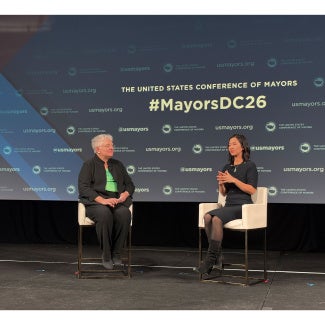2025 Future Forward Grant Awarded to “Beyond the Classroom” Initiative
Grant will support research to reimagine K-12 educational spaces through trauma-informed, culturally responsive, and neurodiverse design.

WASHINGTON – July 14, 2025 – The American Institute of Architects (AIA) 2025 Future Forward Grant has been awarded to Neşe Altıntaş, Assoc. AIA, NOMA, CWA, for her research proposal titled “Beyond the Classroom.”
The “Beyond the Classroom” initiative proposes a transformative approach to K–12 educational architecture by developing two
interdisciplinary frameworks that center healing, emotional regulation, and inclusivity: the Pre-Occupancy Study Toolkit and the Post-Occupancy Evaluation Toolkit. These tools are designed to guide both the planning and assessment of educational environments with trauma-informed, culturally responsive, and neurodiverse design strategies.
The Future Forward Grant, a project by the Large Firm Roundtable (LFRT) and the AIA Young Architects Forum (YAF), supports students, emerging professionals and early career architects in testing innovative ideas that challenge traditional architecture practices. The goal of the $10,000 grant is to foster innovation by providing the necessary resources to pursue untested ideas and drive exploration and disruption in the profession.
Trauma-informed design (TiD) is gaining momentum, yet its integration into school architecture remains underexplored—especially in projects impacted by systemic inequities or traumatic events like school shootings. Budget-driven policies often constrain public school renovation projects, limiting opportunities to prioritize psychological and social well-being in design. This proposal seeks to bridge that gap by introducing a comprehensive process that weaves research, interdisciplinary collaboration, and user-centered feedback into the fabric of educational design.
The initiative features two key tools: the Pre-Occupancy Study Toolkit, designed to help design teams and school districts identify user needs before construction, and the Post-Occupancy Evaluation Toolkit, which assesses how well the completed design supports the developmental, emotional, and social needs of students aged 7–17. By engaging a diverse group of stakeholders—including students, educators, parents, architects, psychologists, neurologists, and community members—this research aims to create scalable, adaptable tools for schools across various regions, types, and cultural contexts.
“Neşe’s vision for a scalable framework for research and post-occupancy evaluations promises to empower firms of all sizes—providing tools to measure impact, improve outcomes, and elevate the profession through data-driven design,” said the Future Forward jury. “We are excited to support this important work over the coming year and look forward to seeing how Beyond the Classroom will shape the future of architectural practice.”
The study will analyze 6–8 case study schools, both in the U.S. and internationally, using a mixed-methods approach that incorporates interviews, surveys, site visits, and behavioral mapping. Insights from this research will shape the toolkits and culminate in a visually engaging report featuring layout templates, stakeholder feedback visualizations, and actionable policy recommendations.
At its core, this initiative redefines the architectural process by embedding empathy, equity, and evidence-based strategies into the design and delivery of educational spaces. Final deliverables will include digital versions of both toolkits, a summary report, a visual framework for K–12 learning environments, and public-facing dissemination through AIA channels.
Learn more about AIA's grant and fellowship programs.
Complete our form to submit a press inquiry or speaking request.
Follow AIA on LinkedIn



